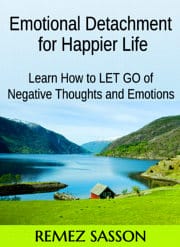
In our daily lives, we encounter numerous situations where people express their opinions, make judgments, and offer unsolicited advice.
While some of this feedback can be constructive and valuable, it is essential to recognize that not all opinions are equal or accurate.
Allowing what others say and think to manipulate us can have a detrimental impact on our behavior, self-esteem, and overall well-being.
Browse our online courses on meditation, positive thinking, overcoming procrastination, confidence, and freedom from distractions.
In this article, we will explore why it is crucial not to let external influences dictate our actions. We will also provide guidance on how to maintain our mental and emotional freedom despite the opinions of others.
Understanding the Power of Words
Words possess immense power. They can inspire, motivate, and uplift, but they can also wound, discourage, and manipulate.
When we place too much importance on the opinions of others, we give away our personal power and allow external forces to shape our self-perception.
It is important to remember that people’s opinions are subjective and influenced by their own beliefs, biases, and experiences. Relying on them as the sole basis for our actions can lead to a constant state of uncertainty and unhappiness.
The Danger of Seeking Validation
One common reason we may be swayed by others’ opinions is the desire for validation. As social beings, we naturally crave acceptance and approval from our peers.
However, seeking validation solely from external sources can become a never-ending quest that leaves us feeling unfulfilled.
When we allow the opinions of others to define our self-worth, we become vulnerable to manipulation and lose sight of our authentic selves.
Building Inner Confidence
To counteract the influence of external opinions, it is essential to cultivate inner confidence.
Inner confidence stems from self-awareness, self-acceptance, and a deep understanding of our values and strengths. When we are secure in who we are, the opinions of others hold less power over us.
Developing a positive self-image and recognizing our own worth empowers us to make decisions based on our own judgment rather than seeking constant approval from others.
Embracing Constructive Criticism
While it is crucial to filter out negative and baseless opinions, it is equally important to be open to constructive criticism.
Constructive feedback can provide valuable insights and help us grow and improve. The key lies in differentiating between genuine constructive criticism and personal attacks or unfounded judgments.
Constructive criticism focuses on specific behaviors or actions and aims to help us develop and reach our potential.
Learning to discern between constructive feedback and destructive criticism is vital in maintaining a balanced perspective.
Surrounding Yourself with Supportive People
The company we keep can significantly influence our thoughts, beliefs, and behavior. Surrounding ourselves with supportive, uplifting, and positive people, who believe in our potential, is instrumental in maintaining a positive mindset.
These individuals can provide encouragement, constructive feedback, and a safe space to express ourselves without fear of judgment.
Cultivating a strong support system enables us to build resilience against the negative opinions of others.
Developing Emotional Resilience
Emotional resilience plays a crucial role in our ability to withstand the impact of external opinions. It involves developing coping mechanisms to navigate criticism, negativity, and judgment.
Practice mindfulness and self-reflection to understand your emotional triggers and develop strategies to manage them effectively.
Engage in activities that boost your self-esteem and emotional well-being, such as exercising, pursuing hobbies, or building a positive attitude.
By strengthening your emotional resilience, you can better protect yourself from the negative influence of others.
Setting Boundaries
Establishing healthy boundaries is essential when dealing with the opinions of others.
Recognize that you have the right to determine what feedback you accept and what you reject.
Set clear boundaries regarding the type of opinions and comments you allow into your life.
Communicate these boundaries assertively and respectfully to others, asserting your autonomy over your own decisions and actions.
Remember, you are in control of your life, and you have the power to filter out external influences that do not align with your values and goals.
Cultivate Detachment
It’s worth cultivating certain degree of detachment. Cultivating detachment is an important practice when it comes to not allowing the opinions of others to manipulate us.
Detachment does not mean isolating ourselves from the world or becoming indifferent. Rather, it is about maintaining a healthy level of emotional distance from external influences.
By cultivating detachment, we can free ourselves from the need for constant validation and approval from others. We learn to observe the opinions and judgments of others without internalizing them or allowing them to sway our behavior.
Detachment allows us to retain our sense of self and make decisions that align with our own values and aspirations, rather than being driven solely by external expectations.
Practicing detachment also helps us cultivate resilience and emotional stability. When we detach ourselves from the opinions of others, we become less reactive to criticism or negativity. We develop the ability to view external opinions objectively and assess their validity.
This detachment allows us to respond to feedback and judgments in a more balanced and constructive manner.
By not allowing the opinions of others to dictate our emotions or behavior, we become more grounded and centered in ourselves, enabling us to navigate through life’s challenges with a greater sense of inner peace and clarity.
Trusting Your Intuition
Often, we possess an internal compass that guides us in making the right choices for ourselves. This intuition, when honed and trusted, can act as a powerful tool in navigating the opinions of others.
Learn to listen to your gut instincts and trust your judgment. While it is essential to consider different perspectives, ultimately, you are the best judge of your own life.
By tapping into your intuition, you can filter out external noise and make decisions that align with your authentic self.
Online Meditation Course: The Path to Awakening
Meditation techniques with guidance for finding inner peace, expanding consciousness, and awakening.
Conclusion
In a world filled with diverse opinions and judgments, it is crucial to maintain a strong sense of self and not allow what people say and think to manipulate our behavior.
By recognizing the subjective nature of opinions, building inner confidence, embracing constructive criticism, surrounding ourselves with supportive people, and following the other advice in this article, we can navigate the external influences with grace and strength.
Remember, your worth and decisions should be based on your own values, dreams, and aspirations, not on the ever-changing opinions of others.
Browse our online courses on meditation, positive thinking, overcoming procrastination, motivation, confidence, and freedom from distractions.


